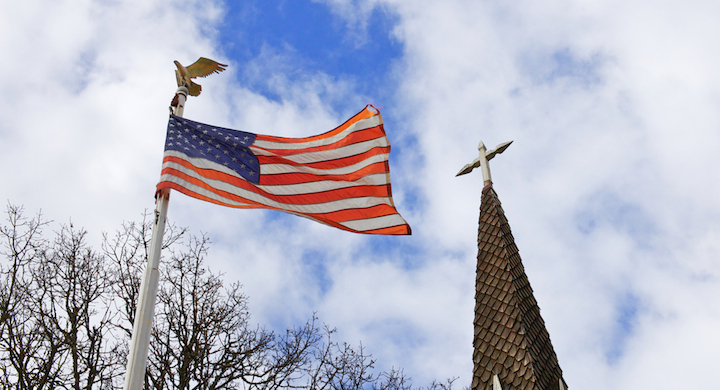Few Sundays of the year do churches get things more wrong than on the Sunday nearest to the 4th of July. The spirituality expressed in nationalistic holidays is a competing, not complimentary, spirituality to that rightly practiced in life of the church. The pride and unity that is affirmed and reinforced through nationalistic holidays is not an aspect of, but potentially at odds with, “the unity of the Spirit through the bond of peace” (Ephesians 4:3) of which scripture speaks. Blending the American story with the Christian story is like sticking clips of “Nightmare on Elm Street” in the middle of “Forest Gump, ” but not nearly as amusing.
In more recent decades about all that most Americans do to celebrate Independence Day is to have family picnics and go to a community fireworks display. However, that is not the case for many who attend worship. Church services on the Sunday nearest to the Fourth of July in many – if not most – American churches celebrate Independence Day in worship. People who never sing patriotic music elsewhere will sing it in church. Special attention is given to the American flag. Furthermore, while most people have never heard an Independence Day oration at a public park or on the lawn of a city hall, they will hear one in church in the form of a sermon.
Examples of the sorts of messages that come from the pulpits across the country are not difficult to find. Internet web sites such as sermoncentral.com, preaching.com, sermonsearch.com, and many others contain messages for Independence Day. Generally the sermons of more recent decades lack the substantial insight and broad historical perspective of many of the available examples of earlier orations. Nevertheless, they serve the same basic purposes: to celebrate the birth of the nation and extol American exceptionalism in order to inspire national pride, deepen affection and loyalty and solidify unity.
While there is considerable diversity among Independence Day sermons, there are common themes. Preachers frequently claim that America was founded as a Christian nation on biblical principles, a dubious assertion at best. Preachers also often proclaim, “America was protected and directed by God from the beginning, ” and that America was settled by people seeking religious freedom in contrast to the “other nations that came into existence by conquest for selfish and ambitious motives. In truth there were as many or more early settlers who came to America “for selfish and ambitious motives” as there were those who came “seeking religious freedom.”
Further, the religious freedom sought by the Puritans was freedom for their own practices, not those of others, a fact neglected by ministers who seek to keep the myth of America’s beginnings untarnished. Assertions which hold that America is “the most welcoming and generous of all nations” abound in these sermons, though this claim was far more true of the nation in the past that in the present. Founding Fathers, Presidents and other luminaries are copiously quoted – and sometimes have fabricated quotes attributed to them – to show the godly nature of America, if not in practice at least in intention.
In many pulpits on the Sunday nearest to the Fourth of July the importance of American is elevated and claims about God’s special providential work in, for and through America are common features in the messages preached. Assurance that God has a special covenant with America is routinely offered from pulpits on Independence Day. As Adrian Rogers, preacher and three term president of the Southern Baptist Convention claimed, “May I tell you again, without stutter, stammer or equivocation, that no nation in the history of the world ever had such a Christian beginning as our God-blessed America. The American dream was placed in the bosom of our founding fathers by the Almighty Himself.”
In a variety of ways pride in American identity is fostered through the Independence Day sermons. The sermons often make it clear that America is exceptional and has been given a special place in God’s providential work to spread freedom throughout the world, peaceably if possible, by force of arms if necessary.
Not surprisingly, it is common for ministers to remind their listeners that while they should love and be loyal to America, they should always be even more faithful to God. However, very rarely is there a suggestion that Christians will ever have to make a choice between the two. Furthermore, what is virtually never heard in an Independence Day sermon is any admonition calling American Christians to be more loyal to the church than to America or to remember that our spiritual attachment to followers of Jesus throughout the world is more precious than a shared identity as Americans.
Independence Day celebrations in worship are occasions to distort Christianity by exalting the nation over the church as an instrument of God for the healing and hope of the world. Too often the sermons for the day present a nationalist false gospel. Branden P. Anderson is correct in saying “this nationalist discourse, which emanates from within the church itself, constitutes a syncretistic salvation narrative, distorted from the Christian faith, entailing a theopolitics that supplants the church with the American nation as the extension of a misappropriated biblical Israel.” (Branden P. Anderson, Chosen Nation: Scripture, Theopolitics, and the Project of National Identity (Eugene, OR: Cascade books, 2012), 150.)
The only way the church can get things right on the Fourth of July is to glorify the God of all nations, giving America no special place. Further, we must affirm again that we are “aliens and exiles” in every nation yet as church we are called to be a “holy nation” and commissioned to “proclaim the mighty acts of him who called you out of darkness into his marvelous light” (1 Peter 2:9-11).

